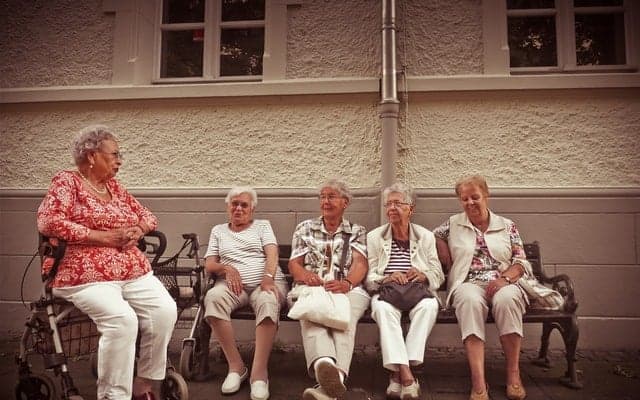Growing old in Italy: Italians live longer but suffer more

Italy has long been one of the countries with the highest life expectancies in the world - but what's it actually like to grow old in Italy? A new report has examined how Italy's elderly population measure up to their counterparts across the EU.
At the age of 65, Italians have an average life expectancy of one year higher than the EU-wide average, according to a report published on Tuesday by national statistics agency Istat.
Italian men aged 65 can expect to live an average of 18.9 years longer, a figure which rises to 22.2 among women.
-
Italy's oldest man dies at the age of 111
-
This Italian celebrated his 96th birthday by jumping out of a plane
-
Italian pensioner fined for crossing the street too slowly
But despite their longevity, Italians aged over 75 struggle with their health more than their counterparts in other countries. The study measured the 'healthy life expectancy', or the number of years people could expect to live in good health, and found that in this respect Italy performed worse than other EU countries.
At the age of 65, Italian men can expect to live a further 13.7 years in good health, compared to 16.1 years in the UK and a 14.4 year EU average. Italian women at 65 had a healthy life expectancy of 14.3 years - significantly less than French women, at 19.3 years, and below the EU average of 15.8 years.
Between the ages of 65 and 74, as Italians begin retirement, they report lower rates for almost all chronic diseases than the other countries surveyed. But once they hit 75, the trend reverses, and about half the population in that category lives with at least one severe chronic disease.
More than one in ten Italian elderly people reported having severe difficulties in personal care activities, such as standing up to get out of bed, taking a shower or bath, or getting dressed, while over three in ten had severe difficulties with household activities such as preparing meals, shopping, and managing medication.
Both health issues and problems with everyday activities were more common among people with lower income and among those living in the south of the country.
And people in these categories were less likely to feel their needs were being met. On average, 58 percent of those reporting difficulties in everyday activities said they need more help than they were getting. But that figure was significantly higher among southern Italians, at 67.5 percent, and among those on lower incomes (64.2 percent).
A possible reason for this is the high 'dependency ratio' in Italy; a falling birthrate coupled with a tendency for longevity has meant the country has the highest ratio of elderly people to working age people.
READ ALSO: The Italian mayor ordering the elderly to defy death
Comments
See Also
At the age of 65, Italians have an average life expectancy of one year higher than the EU-wide average, according to a report published on Tuesday by national statistics agency Istat.
Italian men aged 65 can expect to live an average of 18.9 years longer, a figure which rises to 22.2 among women.
- Italy's oldest man dies at the age of 111
- This Italian celebrated his 96th birthday by jumping out of a plane
- Italian pensioner fined for crossing the street too slowly
But despite their longevity, Italians aged over 75 struggle with their health more than their counterparts in other countries. The study measured the 'healthy life expectancy', or the number of years people could expect to live in good health, and found that in this respect Italy performed worse than other EU countries.
At the age of 65, Italian men can expect to live a further 13.7 years in good health, compared to 16.1 years in the UK and a 14.4 year EU average. Italian women at 65 had a healthy life expectancy of 14.3 years - significantly less than French women, at 19.3 years, and below the EU average of 15.8 years.
Between the ages of 65 and 74, as Italians begin retirement, they report lower rates for almost all chronic diseases than the other countries surveyed. But once they hit 75, the trend reverses, and about half the population in that category lives with at least one severe chronic disease.
More than one in ten Italian elderly people reported having severe difficulties in personal care activities, such as standing up to get out of bed, taking a shower or bath, or getting dressed, while over three in ten had severe difficulties with household activities such as preparing meals, shopping, and managing medication.
Both health issues and problems with everyday activities were more common among people with lower income and among those living in the south of the country.
And people in these categories were less likely to feel their needs were being met. On average, 58 percent of those reporting difficulties in everyday activities said they need more help than they were getting. But that figure was significantly higher among southern Italians, at 67.5 percent, and among those on lower incomes (64.2 percent).
A possible reason for this is the high 'dependency ratio' in Italy; a falling birthrate coupled with a tendency for longevity has meant the country has the highest ratio of elderly people to working age people.
READ ALSO: The Italian mayor ordering the elderly to defy death
Join the conversation in our comments section below. Share your own views and experience and if you have a question or suggestion for our journalists then email us at [email protected].
Please keep comments civil, constructive and on topic – and make sure to read our terms of use before getting involved.
Please log in here to leave a comment.